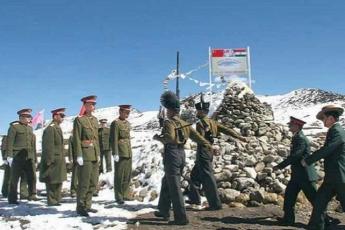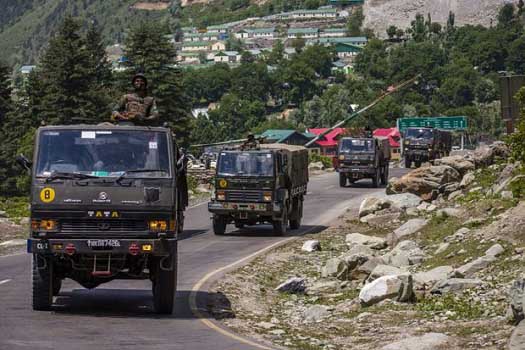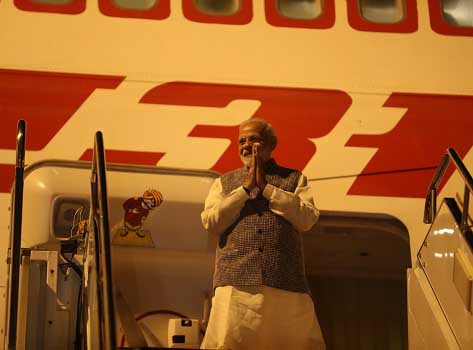‘China needs to be prepared to defeat India’s illusions through military actions’

Global Times
Beijing: “Facts show that it is difficult for China to keep India rational on important issues through persuasion and talks. Our effective use of strength is indispensable. We must increase the cost of risky gambles of India on the border issue.
“While making diplomatic efforts, we need to be prepared to completely defeat India’s illusions through military actions when those efforts fail,” Global Times said in an editorial on Friday.

“To maintain territorial integrity and long-term tranquility of our southwest border, no price is too high. This is not a slogan, but should be our true will. Chinese people love peace, but we will also fight when we have to. This is not just a facade to the outside world, but who we are,” the newspaper added.
It noted that China’s State Councilor and Foreign Minister Wang Yi met Indian Foreign Minister Subrahmanyam Jaishankar in Moscow Thursday evening, and they reached a five-point consensus. “This is generally believed to provide an important opportunity for China and India to ease the border situation. The two foreign ministers passed on their goodwill to each other, expressed common understanding that the current border tensions are not in line with the two countries’ interests, and expressed their wish to maintain peace and tranquility at the border. This helps cool down the two countries’ public opinion.”
The newspaper said the consensus again mentioned the two troops should disengage as soon as possible, maintain a necessary distance, and speed up the completion of new measures to build mutual trust.
Whether in terms of crisis management or maintaining long-term stability at the border area, the consensus had hit the key points.
“But how should the consensus be implemented? Chinese and Indian leaders met many times and reached consensus after the Doklam standoff, but then border conflicts happened again. In June, the deadly clash happened, and Indian troops fired threatening shots at the Chinese army on Monday. The border situation has repeatedly eroded people’s confidence in the implementation of the agreement.
“The fundamental problem between China and India is the lack of basic mutual trust. The border issue has been fully activated, forming the two societies’ confrontation of wills. Both believe they have the advantage, and China’s advantage is based on strength.
The gap between China and India in national strength is much wider than in 1962. India’s sense of superiority comes from its geopolitical mobilization capabilities. The US, Japan and Australia are trying to win over India. New Delhi believes Beijing is afraid of this since China is being strategically blocked by the US. India believes China will yield at the border.
China takes a defensive position, but India is trying to connect the China-India border conflicts with Indo-Pacific geopolitics, which is a gamble.
“China and India have both developed over the years. Although India’s GDP is only one-fifth of China’s, it also has the ability to strengthen infrastructure in border areas.
The two countries’ strengths extend to the border, and the opportunities for frictions have increased sharply. The previous control mechanism, without the reinforcement of political mutual trust, has been riddled.

“On the other hand, China and India do not want to start a new war. The two militaries have engaged in scuffles many times, which have led to casualties. Indian troops have fired warning shots, but there has been no serious military conflict between the two sides. This has only happened at China-India border areas, which is enough to show the two countries do not want a war.
“But the repeated conflicts and confrontations also show that restoring peace at the border is no longer easy. The problem lies with India.
“There are different forces in India, and the Indian government has less control over border policies than China. Nationalist sentiment through India’s election mechanism has a strong influence on the Indian government.
“India’s national strength has increased. Although its gap with China has widened, Indian society does not believe so. Indian nationalist forces always have been conceited, such as “it is not 1962 anymore,” or India can come back with a vengeance on China once another war breaks out at the border. They have seriously overestimated their strength and support from the US, Japan and Australia. Some even imagine that a new China-India border war will be a joint war between the US, Japan, Australia, India and China.
“India’s public opinion mechanism has led to frequent exchanges between the Indian military and media. The country’s public opinion war against China is active.
The Indian military needs to release such information as “preemptive strike” and “seize the commanding heights” to please the public. This has boosted Indian troops’ aggressiveness,” the Global Times concluded.





